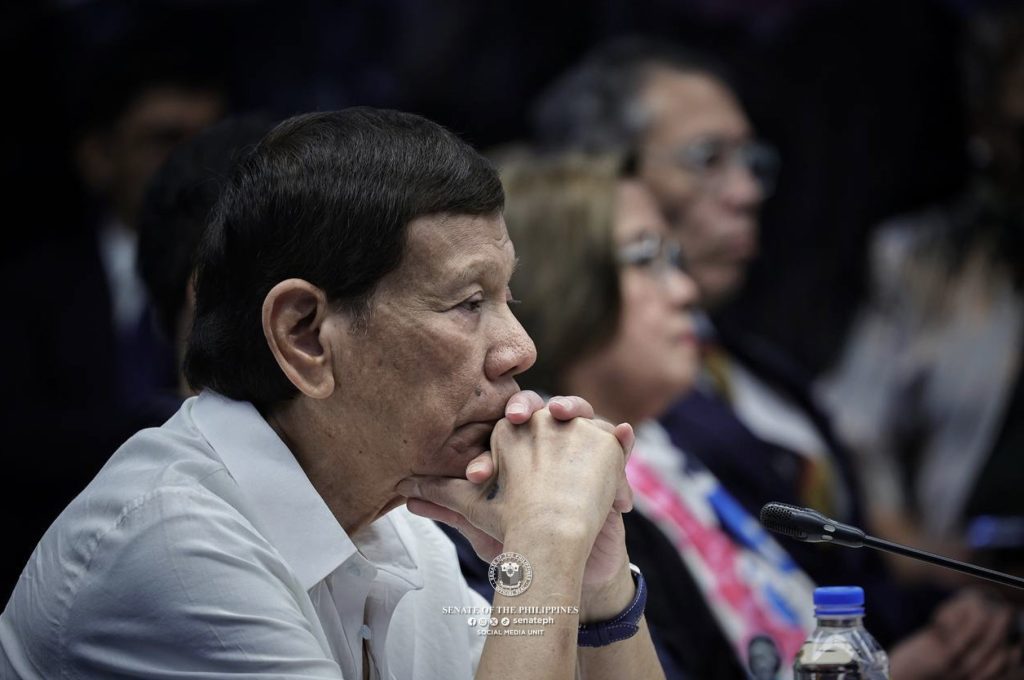
DAVAO CITY, Philippines – Human rights lawyers in Mindanao criticized former President Rodrigo Duterte for his statements made during the Senate hearing as he justified the extrajudicial killings in his war on drugs campaign.
The Senate blue ribbon subcommittee held its first hearing on drug-related killings on October 28 in which Duterte attended. The former president testified and claimed “full responsibility” for police officers killing criminals during his term as mayor of Davao City as this was done under his order, especially on drug suspects resisting arrest.
But the Union of Peoples’ Lawyers in Mindanao (UPLM) believed the former president was evading responsibility when asked by Senator Risa Hontiveros about specific cases when the war on drugs was raised as a national police operation under his term.
“His selective, even conditional, acceptance of responsibility exposes a troubling standard of accountability. His rhetoric fostered a culture of violence among those who implemented his war on drugs,” the group said in their statement.
When Duterte was asked about his accountability of the police killing of high school student Kian delos Santos, the former president distanced himself from it. Delos Santos was killed in a police operation in Manila on August 16, 2017, where three police officers were found guilty and sentenced to 40-years imprisonment.
“Cases like the tragic death of Kian delos Santos— a young student killed in an operation where abuse of power was clear—underscore the painful human cost of policies that blurred the line between law enforcement and outright abuse. The prosecution and conviction of the officers involved in Kian’s death is a testament to the need for accountability.,” UPLM said.
“Duterte’s selective acceptance of ‘responsibility’ without legal consequences leaves a gap between ethical responsibility and judicial accountability,” says Romeo Cabarde, head of the Ateneo de Davao Public Interest and Legal Advocacy (APILA).
UPLM urged the Senate, and also the House of Representatives which has conducted a quad-committee hearing on the same issue, to submit all testimonies made by former police officials and others, including President Duterte, to the International Criminal Court (ICC) for consideration and the Department of Justice to cooperate in the tribunal’s ongoing investigation.
The ICC has been investigating the former president for crimes against humanity as his nationwide war on drugs campaign had killed between 6,000 to 20,000 people.
The families of the victims are organized under Rise Up and is supported by the National Union of Peoples’ Lawyers (NUPL) in filing their petition to the ICC in 2018 to make Duterte stand trial.
The Senate blue ribbon presiding chair, Senator Aquiliino ‘Koko’ Pimentel III, said they may not invite the former president for the next hearings as they will gather more information from other sources.
At the House quad-committee hearings, revelations were made by former police officials under Duterte of rewards systems and rubouts conducted by the police in its nationwide drug war.
Cabarde observed that Duterte is “framing the drug was as a necessary response to a social problem… he places the war on drugs beyond ordinary legal limits, implying that his authority justifies extreme actions — even if it means deaths like that of Kian delos Santos.”
Another distinction Duterte made with his statement is being a “charismatic authority” by portraying himself as a “protector”.
“By claiming his actions were part of a “covenant” with voters, he seems to seek public support as validation for his policies, attempting to override criticism and legal accountability by framing himself as a leader who “did what had to be done.””
This ambiguity, Cabarde said, shows “complexity of power and responsibility in governance, underscoring the struggle between public protection and human rights within authoritarian leadership models.”
UPLM said: “It may sound trite, ‘Ours is a government of laws and not of men’. Command responsibility holds Duterte fully accountable for the drug war killings.”
The lawyers urged President Ferdinand Marcos Jr. to make the Philippines return to the Rome Statute of the ICC “to categorically demonstrate our nation’s commitment to upholding human rights and ensuring accountability mechanisms for our leaders now and in the future.” (davaotoday.com)










